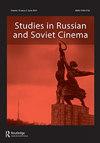Editorial
IF 0.4
0 FILM, RADIO, TELEVISION
引用次数: 0
Abstract
The third issue of Studies in Russian & Soviet Cinema for 2022 presents three articles and a discovery. Let us turn to the contributions: first, we have an article by Olga Davydenko, who was one of the winners of the 2021 competition of best student articles at St Petersburg State University for Film and Television, which – in the hibernation period of the pandemic, we organised for the second time with the wonderful Polina Stepanova, because we wanted our students to have a little bit of a challenge in these dull days of lockdowns. The article offers a fine investigation of the acting ‘mask’ of the actor Igor’ Il’inski, whose work is here explored in the films of the silent era. Second, there is an article on the scenarios of Aleksandr Rzheshevskii, who scripted, among other films, Sergei Eisenstein’s Bezhin Meadow. Sergei Ogudev brilliantly analyses Rzheshevskii’s scripts within the context of narrative theories. The third article in this issue comes with a discovery, of Andrei Tarkovsky’s and Andrei Konchalovsky’s script for their unrealised project Antarctica, Faraway Country, finalised in 1966. Parts of an earlier version of the script (from the late 1950s) are known, but the scholars Nina Sputnitskaia and Maksim Kazyutchis have accomplished something else here, namely the reconstruction of the working process from the first version to the final script, which is published as an appendix to their article. In their discussion, they draw out the origins in this script of later characteristic features of Tarkovsky’s oeuvre. As usual, we have a selection of book reviews, prepared and presented by Stephen M. Norris, to whom I express my gratitude. And – as always, Studies in Russian & Soviet Cinema encourages submissions on any aspect of pre-Revolutionary, Soviet-era and post-Soviet cinema and visual culture, including the former Soviet territories. We operate a system of double-blind peer-review; submissions should be original (i.e. previously unpublished, including publications in another language) and will be considered at any time throughout the year. They should be sent to the editor at birgit.beumers@gmail.com.编辑
《俄罗斯与苏联电影研究》2022年第三期将刊登三篇文章和一项发现。让我们来看看贡献:首先,我们有一篇奥尔加·达维登科的文章,她是2021年圣彼得堡国立电影电视大学最佳学生文章比赛的获胜者之一,在大流行的冬眠期,我们与出色的波琳娜·斯捷潘诺娃第二次组织了这场比赛,因为我们希望我们的学生在这些沉闷的封锁日子里有一点挑战。这篇文章对演员伊戈尔·伊林斯基的表演“面具”进行了细致的调查,他的作品在这里是在无声时代的电影中探索的。第二,有一篇关于亚历山大·热舍夫斯基(Aleksandr Rzheshevskii)的剧本的文章,他是谢尔盖·爱森斯坦(Sergei Eisenstein)的《别津草地》(Bezhin Meadow)等电影的编剧。谢尔盖·奥古德夫在叙事理论的背景下出色地分析了热舍夫斯基的剧本。这期的第三篇文章是关于安德烈·塔可夫斯基和安德烈·康查洛夫斯基在1966年完成的未实现的项目《遥远的南极洲》的剧本的发现。手稿的早期版本(1950年代末)的部分内容已为人所知,但学者尼娜·斯普特尼茨卡娅和马克西姆·卡泽奇斯在这里完成了其他一些工作,即重建了从第一版到最终版的工作过程,该手稿作为他们文章的附录发表。在他们的讨论中,他们从这个剧本中引出了塔可夫斯基作品后期特征的起源。像往常一样,我们有一些书评精选,由斯蒂芬·m·诺里斯准备并呈现,我向他表示感谢。此外,一如既往,《俄罗斯和苏联电影研究》鼓励提交革命前、苏联时代和后苏联时代的电影和视觉文化的任何方面,包括前苏联领土。我们实行双盲同行评审制度;提交的作品必须是原创的(即以前未发表的,包括其他语言的出版物),并将在全年的任何时候被考虑。请将稿件发送至birgit.beumers@gmail.com。
本文章由计算机程序翻译,如有差异,请以英文原文为准。
求助全文
约1分钟内获得全文
求助全文

 求助内容:
求助内容: 应助结果提醒方式:
应助结果提醒方式:


